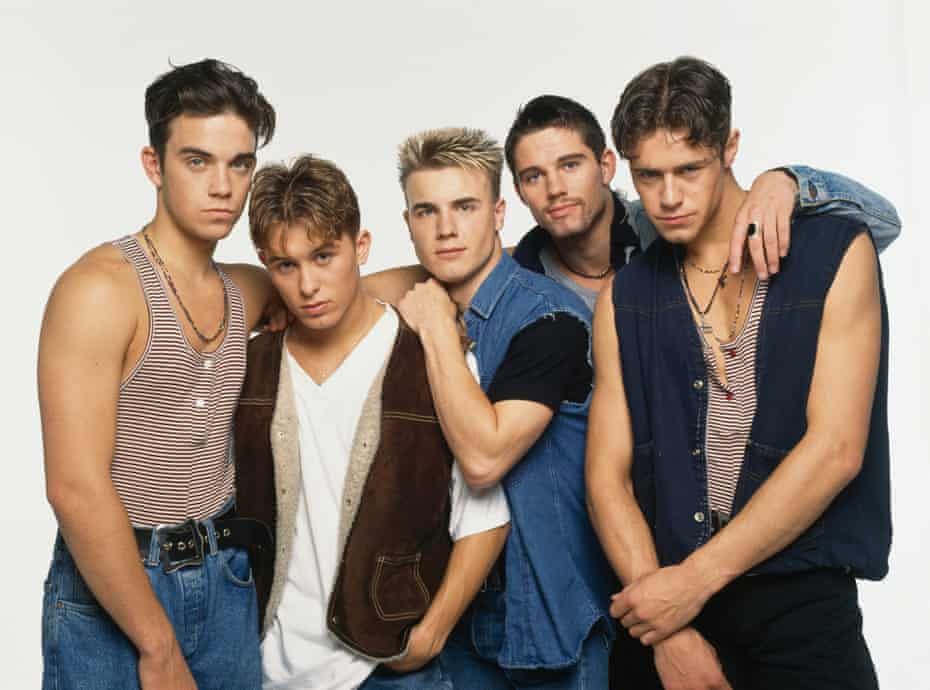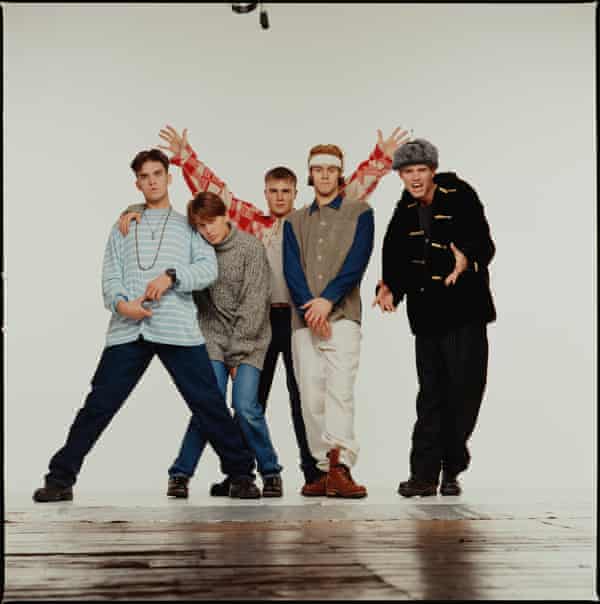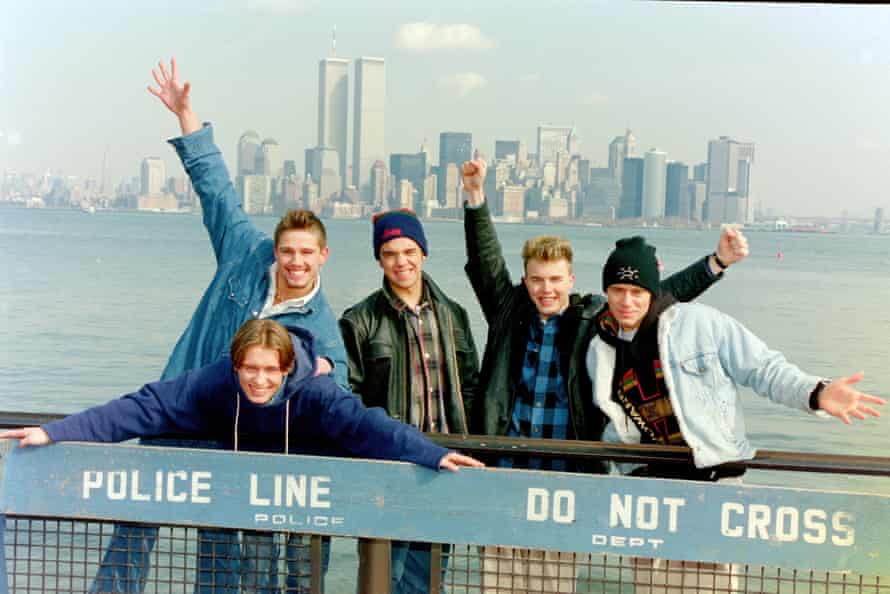Take That’s 20 greatest songs – ranked! | Take That
20. Hold Up a Light (2008)
An overlooked single from The Circus, Hold Up a Light transcends its slightly hokey desire to provoke live audiences to, well, hold up a light, thanks to Mark Owen’s slightly doleful vocal, a lovely string arrangement and an unexpected burst of Queen-y double-tracked guitar.
19. Once You’ve Tasted Love (1992)
Understandably overshadowed by their later hits – including the disco cover versions It Only Takes a Minute, Could It Be Magic and Relight My Fire, not included in this list of original compositions – Take That’s second single is both a great little song and a charming period-piece snapshot of early 90s British pop. The bleeping analogue synths and samples of cheering crowds are audibly influenced by the KLF’s 3am Eternal.
18. Love Love (2011)
Take That were never weirder than on Progressed, the EP of offcuts appended to their 2010 album Progress. The Stuart Price-produced Love Love is appealingly off the wall – squelching synthesisers, a bizarrely stentorian Gary Barlow vocal, an octave leaping chorus. It’s clearly not what most Take That fans buy their records expecting to hear, which is part of its appeal.
17. Wooden Boat (2006)
With the best will in the world, Take That are no one’s idea of a great albums band, but, just occasionally, something worth salvaging slips into the bits between the hits. So it is with the beautiful, acoustic Wooden Boat, which sounds oddly like the Lilac Time, the folk-rock band fronted by Robbie Williams’s solo collaborator Stephen Duffy.

16. Pretty Things (2010)
Progress – which saw Robbie Williams temporarily return to the fold – is, by some distance, Take That’s best album: surprisingly experimental, devoid of their trademark big ballads. Pretty Things is a low-key highlight: subtle electropop, over which Williams self-deprecatingly ruminates on ageing, marriage and the loss of youthful charm.
15. Giants (2017)
Since the departure of Jason Orange and Williams, Take That’s releases have tended towards the serviceable rather than the spectacular, an excuse to tour rather than an end in themselves. That said, they are sometimes better than you might expect, as demonstrated by Giants, a slice of super-hooky, thoroughly modern arena-ready pop.
14. When We Were Young (2011)
The re-formed Take That were never afraid to tug at their long-term fans’ heartstrings by writing about the band’s tumultuous past. Which brings us to the prosaically titled When We Were Young, an affecting giant-chorused song with a distinctly Abba-esque melody. “We were the foolish, fearless … We didn’t know it wouldn’t last.”

13. A Million Love Songs (1992)
The first sign that Barlow had ambitions beyond fleeting pop fame, A Million Love Songs was written when he was 15. It’s audibly influenced by Elton John – the Elton of the mid-80s, rather than the 70s – but tricked out with Mellow Magic sax and vaguely doo-wop-ish backing vocals.
12. Sure (1994)
One of those No 1s people seem to have forgotten was a No 1 – and swiftly overshadowed by its follow-up, Back For Good – Sure was Take That’s last single in pop-R&B mode. It’s a sweet example of type, although Q magazine’s 2003 suggestion that it was the second greatest pop single ever made is pushing it a bit.

11. The Flood (2010)
Williams’s return to Take That was announced in pitch-perfect style with portentous verses, singalong chorus and lyrics that commented on the improbability of their reunion – “They said we’d never dance again”. There was also a hint of promo for the forthcoming tour stirred in: “We will meet you where the lights are.”
10. Kidz (2010)
The improbable, thoroughly enjoyable sound of Barlow and Owen in Goldfrapp-esque electro-glam stomp mode. Simon Cowell considered its lyrical content too politically provocative for The X Factor, which tells you more about him than the harmless lyrics, although Owen’s sneer of “What yer lookin’ at?” is priceless.
9. Everything Changes (1993)
The Everything Changes album crowned Take That as British pop’s biggest band; it was 1993’s bestselling album and home to four consecutive No 1 singles. There’s a hint of prime-time Stock Aitken and Waterman about its title track’s cantering rhythm and joyous retro soul melody, although the production is far lusher than SAW’s cheap and cheerful approach.
8. Greatest Day (2008)
For a band whose ex-members’ solo careers had seemed out of step with musical trends – Williams excepted, of course – the re-formed Take That had a canny understanding of how mainstream 00s pop clicked. Hence Greatest Day, which beat Coldplay at their own game: pounding drums, slow buildup to epic, arena-sized chorus.

7. Babe (1993)
A soap opera plotline condensed into five minutes of strings, darkly atmospheric synths and quiver-y lipped Owen vocals. Man tracks down long-lost love, and discovers her living with – OMG! – his hitherto-unknown child. It was very nearly the Christmas No 1, but something about the churning climax suggests the story doesn’t end well.
6. Pray (1993)
Boybands in the 90s tended to major in pop-R&B, but Take That’s first No 1 offered pop-R&B of a noticeably superior standard. The strings recall classy mid-70s soul and it has the kind of chorus that superglues itself to your brain. Its famous, pecs-out video didn’t do its success any harm, but Pray could sell itself.
5. Shine (2006)
Shine’s familiarity has bred a certain contempt – its jauntiness now grates on the nerves a bit – but it started turning up everywhere for a reason. Both its melody and its 60s-pop-by-way-of-the-Scissor Sisters sound were charming, and once you know the lyrics are about Williams’s mental health problems, it’s also oddly moving.
4. Rule the World (2007)
As cinematic blockbuster ballads go, Rule the World – written for Matthew Vaughn’s star-studded, largely forgotten fantasy movie Stardust – is hard to beat. Its chorus basically defies you not to punch the air; it might have been designed to be performed, as it eventually was, at the epic closing ceremony of the 2012 Olympic Games.

3. Never Forget (1995)
Williams left after its release, but from its You Can’t Always Get What You Want-esque kids’ choir intro to its smiling-through-tears chorus, Never Forget offered the perfect roll-credits closing theme for Take That’s initial career. Extra points for the bizarre production credits, featuring Meat Loaf mastermind Jim Steinman and UK house duo Brothers in Rhythm.
2. Patience (2006)
“The greatest comeback single of all time,” said the Manic Street Preachers’ Nicky Wire of Patience. “If Neil Young had written it, people would be calling it a masterpiece.” Certainly, it’s a brilliant, hugely assured and completely unforced-sounding piece of songwriting, a signal that Take That’s reunion was going to be about more than mere nostalgia.

1. Back for Good (1995)
A song so great people refused to believe Barlow had written it. Unfounded rumours claimed it was the covert handiwork of Barry Gibb, repaid for his efforts when Take That subsequently covered How Deep Is Your Love. In 2013, Gibb told the Guardian he had “never even heard” Back for Good, although you can see how people might think he was involved if you imagine the chorus’ backing vocals sung by the Bee Gees. Perhaps Barlow could console himself with the thought that he had written something of such quality, it belonged in one of the greatest songwriting catalogues in pop history; certainly, its swooning, bittersweet loveliness is on a different level to anything you might reasonably expect a 90s boyband to have produced.

